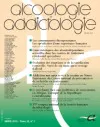| Titre : | Entretiens de motivation et exposition à l'alcool. La pratique des TCC à l'Intersecteur d'Alcoologie du Hainaut (2000) |
| Titre traduit : | (Cognitive and behavioural therapy at the Hainaut Alcohology clinic. Motivation interviews and alcohol exposure) |
| Auteurs : | B. GIBOUR ; D. GACKIERE-ERALDI ; P. GRAZIANI ; M. HAUTEKEETE |
| Type de document : | Article : Périodique |
| Dans : | Alcoologie et Addictologie (Tome 22, n°4, Décembre 2000) |
| Article en page(s) : | 363-370 |
| Note générale : |
Alcoologie et Addictologie, 2000, 22, (4), 363-370
|
| Langues: | Français |
| Discipline : | TRA (Traitement et prise en charge / Treatment and care) |
| Mots-clés : |
Thésaurus mots-clés ALCOOL ; THERAPIE COGNITIVO-COMPORTEMENTALE ; THERAPIE COMPORTEMENTALE ; THERAPIE DE GROUPE ; METHODE ; MOTIVATION ; CONDITIONNEMENT ; STRATEGIE ACTIVE D'ADAPTATION ; PROGRAMMEThésaurus géographique NORD-PAS DE CALAIS |
| Résumé : |
FRANÇAIS :
Les modèles cognitivo-comportementaux offrent un large éventail de techniques qui s'appliquent aux addictions alcooliques ou toxicomanes. Du groupe à l'individuel, en hospitalisation ou en ambulatoire, les TCC permettent au thérapeute d'adapter la prise en charge aux objectifs du patient et donc à sa motivation. Pour ces raisons et d'autres encore, les TCC structurent la prise en charge psychothérapeutique à l'intersecteur d'Alcoologie du Hainaut. Nous nous proposons donc de présenter ici deux techniques particulières de cette prise en charge que nous avons intégrées et développées depuis quelques années : l'entretien de motivation et l'exposition aux stimuli alcooliques. La première vise à rendre le patient acteur de son propre changement et à adapter la prise en charge au stade de motivation du patient. La deuxième est une technique très peu répandue en France dont la valeur thérapeutique a été maintes fois démontrée dans les pays anglophones. Son application dans notre pays expose le thérapeute à quelques critiques et réticences très souvent injustifiées. (Résumé d'auteur) ENGLISH : Cognitive-behavioural models provide a wide range of techniques that can be applied to alcoholism and drug addiction. For group therapy or individual therapy, in inpatients or outpatients, cognitive-behavioural therapy allows the therapist to adapt management to the patient's objectives and therefore to his or her motivation. For these and other reasons, cognitive-behavioural therapy is used to structure psychotherapy at the Hainaut Intersecteur d'Alcoologie. The authors present two particular techniques of this management that they have integrated and developed over several years: the motivation interview and exposure to alcoholic stimuli. The first is designed to make the patient take charge of his or her own need for change and to adapt the management to the patient's level of motivation. The second is a technique that is not widely used in France, although its therapeutic value has been demonstrated on many occasions in the English-language literature. Its application in France exposes the therapist to several criticisms and reticences that are very often unjustified. (Author' s abstract) |
| Domaine : | Alcool / Alcohol |
| Refs biblio. : | 36 |
| Affiliation : |
Intersect. Alcool. du Hainaut, Ctre Hosp., 59230 St-Amand-les Eaux France |
| Numéro Toxibase : | 205404 |
| Centre Emetteur : | 02 Coordonnateur |
 Accueil
Accueil



